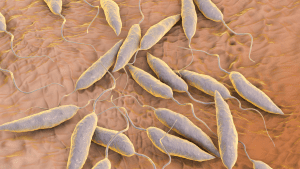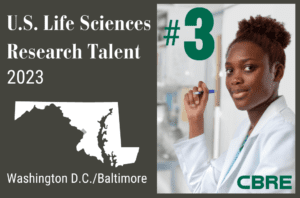
Healthcare Systems Rise Up to Develop Innovative Solutions to COVID-19 Testing Shortages
The availability of reliable, high-quality testing and the capacity to turn around results quickly remain two areas of significant unmet need in the fight against the coronavirus pandemic.
As state governors band together to collaborate on reopening their respective state economies, the capacity to administer and process polymerase chain reaction (PCR) and antibody testing remains a crucial tool for these leaders to effectively stage and plan a gradual return to everyday life.
In early April, Governor Hogan proacively approved 14 additional clinical laboratories in Maryland to provide surge testing services. Baltimore County-based Real Diagnostics also received FDA Emergency Use Authorization (EUA) to offer COVID-19 testing immediately to hospitals, healthcare systems and government agencies. Hogan’s surge testing decision and Real Diagnostic’s EUA have put the state of Maryland in a better place when it comes to testing capacity.
However, work around testing quality and capacity still needs to be done. Without comprehensive, accurate tracing and mapping of active COVID-19 cases and the widespread ability to identify individuals with SARS-Cov-2 antibodies, kick starting economies, opening schools and allowing events risks undoing all the good work social distancing has done to date to flatten the curve.
Government agencies, private healthcare systems, academic research institutions and public and private life science companies across the region are actively banding together, sharing data and partnering to stem the coronavirus pandemic as fast as they can without sacrificing testing safety and efficacy standards.
Test development and deployment is a big part of the BHCR’s contribution to the fight against the coronavirus. In our effort to continually update the region on COVID-19 developments, we present some recent COVID-19 updates from agencies and life science companies from the region, with a particular focus on recent test development progress and news.
Children’s National Hospital
In collaboration with local labs and its own in-house testing capabilities, Children’s National has increased testing capacity in the local community. As has been widely reported, there is a serious shortage of testing supplies in the U.S. The supply shortage has created an ultra-competitive global market where healthcare organizations like Children’s National Hospital have to bid against thousands of global competitors for this essential tool in the fight against the coronavirus pandemic.
Looking ahead and recognizing that shortages of certain materials would likely become a problem, Dr. Meghan Delaney, Chief, Pathology and Lab Medicine and Director, Transfusion Medicine at Children’s National Hospital, took a creative route to solve this challenge. With the help of her colleague, Dr. Eric Vilain, Director, Center for Genetic Medical Research, Children’s secured the Center for Disease Control’s (CDC) “recipe” for the transport medium, a solution required to ship swab samples safely and effectively from intake sites to analysis laboratories. The team ordered the needed supplies to create and test their own “homebrew” of the transport medium in the Children’s National sterile laboratories, recognizing that Children’s had both the facilities and expertise onsite to produce a supply of transport medium that would allow COVID-19 testing to continue.
Recognizing that supplies were running low, Dr. Delaney reached out to Dr. Vilain to start production of transport medium using the CDC’s formula. About that same time, Dr. Delaney heard from her colleague, Dr. Anthony Tran at the Washington DC Public Health Laboratory, that their supply of transport medium was also running low. Dr. Delaney and Dr. Vilain swung into action, with Dr. Vilain’s team working morning to evening that Saturday in the lab to produce the needed supplies.
“As a leader in pediatric research and innovation, the Children’s National clinical and research teams have ongoing collaborations to find solutions and create breakthroughs in pediatric healthcare. While COVID-19 is an unprecedented challenge, we are fortunate in that our expertise, facilities and collaborative culture enables us to swiftly identify and focus the right talent and resources on emerging issues,” stated Dr. Delaney.
“In addition, Children’s National has long standing relationships with many academic and public health organizations and those relationships enhance our resource network and theirs. We are all working together to serve our patients and our community at this critical time,” she added.
As of last Monday, the team had prepared 1,000 vials of the transport medium that were delivered to the DC Public Health Laboratory. They immediately began preparing another 5,000 vials for use at Children’s National ER, clinics and its drive-up testing site.
Dr. Cath Bollard’s lab at Children’s has also developed a unique lab-on-a-chip strategy for high throughput combinatorial drug screening that offers significant benefits over conventional checkerboard assays.
Drugs such as Hydroxychloroquine and Remdesivir have displayed synergy against COVOD-19. However, assessment of dosage and antiviral characteristics of dozens of drug candidates can normally take weeks or months. Using the lab-on-a-chip strategy allows real-time dose as well as time dependent cell responses/viability monitoring via time-lapse imaging to determine drug efficacies. In addition to low-cost (<$1/device), extremely high throughput and the requirement of only small volumes of reagents (< 1ml), only a few thousand cells will be required to carry out this combinatorial assay. This study will allow identification of effective therapeutics against COVID-19 while offering the potential for personalized screening of individual patients.
University of Maryland School of Medicine Launches Large Scale COVID-19 Testing Plan
On April 10, the University of Maryland School of Medicine (UMSOM) announced it had received $2.5M in funding from the state of Maryland to expand its COVID-19 testing initiative.
The coronavirus testing initiative will be led by UMSOM’s Dr. Claire Fraser, the Dean’s Endowed Professor and Director of the Institute for Genome Sciences (IGS) and Dr. Sanford Stass, professor and chair of both the UMSOM Department of Pathology and Department of Medical and Research Technology. The COVID-19 testing initiative is a collaborative effort with the University of Maryland, Baltimore (UMB) and the university’s Interim President Dr. Bruce Jarrell.
Within a few months time, the program hopes to scale up its testing capability to be able to perform 20,000 tests per day, which will increase testing access in Maryland with the support of the City of Baltimore and the Maryland State Health Department.
IGS at UMSOM will analyze the tests using robotic platforms and automated technology at the University of Maryland Pathology Associates (UMPA), which is a CLIA/CAP accredited lab operated by the UMSOM Department of Pathology. According to recent reporting, the lab will be able to turn around results to individuals within 24 to 48 hours, which is a marked improvement over commercial lab COVID-19 test processing that can take up to one week to deliver results.
Howard Hughes Medical Institute Partners with Aperiomics to Scale COVID-19 Testing
Aperiomics, a biohealth data science company located in Sterling, Virginia announced on March 23rd, 2020 that it had launched Xplore-Covid-19 test, a new diagnostic test that uses throat swab samples and DNA extraction and PCR technologies to identify genetic markers within the coronavirus.
The organization, which is led by CEO Crystal Icenhour, has partnered with Integrated DNA Technologies (IDT) and Zymo Research on the Xplore-Covid-19 tests.
Aperiomics initially was able to produce about 1,000 tests per week, but a new, recent partnership with the Howard Hughes Medical Institute’s Janelia Research campus in Ashburn, Virginia has increased capacity to approximately 2,500 tests per week. The Xplore-Covid-19 test generates results within a same day turn around window.
The company is well-known for its Xplore-BIOME bioinformatics algorithms and Deep Shotgun Metagenomic Sequencing technology that helps physicians identify the causes of their patient’s infections which are traditionally not identifiable through other testing. Icenhour and her team have been on a mission to revolutionize the way doctors around the world identify infections. Because of this deep well of experience, the organization was able to quickly pivot to COVID-19 test development to help the fight against the spread of the coronavirus.
Johns Hopkins Develops Own Coronavirus Test
In early March, Johns Hopkins doctors realized that national test shortages would prevent them from testing all of their patients in need, so they took it into their own hands to develop their COVID-19 diagnostic test.
The test, developed by Johns Hopkins’ clinical microbiologists Karen Carroll, M.D., and Heba Mostafa, M.B.B.Ch., Ph.D., was first used on March 11. Within three days, approximately 85 tests were performed. The test analyzes a nasal or oral swab and takes 24 hours to yield results, but Mostafa hopes she can shorten that to as little as three hours while ramping capacity up to as many as 1,000 tests per day.
You can read more about what’s going on at Johns Hopkins regarding COVID-19 here.
- About the Author
- Latest Posts
Steve brings nearly twenty years of experience in marketing and content creation to the WorkForce Genetics team. He loves writing engaging content and working with partners, companies, and individuals to share their unique stories and showcase their work. Steve holds a BA in English from Providence College and an MA in American Literature from Montclair State University. He lives in Frederick, Maryland with his wife, two sons, and the family dog.





